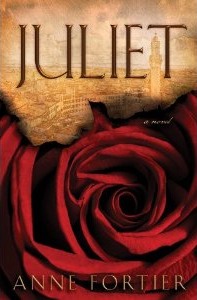This is the first in a series of posts discussing various works that may be considered “stealth” speculative fiction—by which I mean, science fiction that is not marketed as such, but which undeniably embraces speculative elements. This may include movies, books, plays, poetry, and anything else that catches my eye.
Good. Whew. Now that’s out of the way, let’s talk about Anne Fortier’s Juliet.
Juliet is the story of Julie Jacobs, a woman orphaned at a young age in Italy and raised by her Aunt Rose in America, who returns to Italy after the death of her aunt seeking some clue as to her family history. She’s been both urged to and cautioned against this trip, but she’s left with little option, as her aunt’s entire estate has been willed to Julie’s despised sister Janice, and Julie (feckless, unemployed, and deep in debt) is left with only a ticket to Italy, the name of a bank manager, and a passport in her birth name—which turns out not to be Julie Jacobs at all.
Upon her arrival in Siena, Julie (or Giulietta Tolomei, as the case may be) is caught up in a web of intrigue and colorful characters, meanwhile attempting to locate a family treasure and solve a historical mystery—what really happened to Romeo and Juliet?
For it turns out that Julie’s family, the Tolomeis, are the model for Shakespeare’s Capulets, and another of Siena’s great families, the Salimbenis, were the model for the Montagues. Shakespeare, that notorious lifter of plots, lifted this one as well—from what we are given to understand was actual history, that played out a bit differently than what’s in the…well, the play.
There’s a predictable romance with a glowering Italian policeman and rather a lot of skulking about, seasoned with the occasional attempt to do Julie violence. But the pleasures of Juliet have very little to do with its plot, and a great deal to do with its setting. The actual uncovering of the historical mystery is sadly given short shrift, as someone else has already done the hard work of locating and translating various historical documents. This is somewhat sad, as I could not help but contrast that with the more successful handling of a similar plot in A.S. Byatt’s Possession. I also found some of the characterization, especially that of Julie’s sister Janice, a bit erratic.
Siena past and present, however, steals the show. I found myself skimming the romance and adventure to get to the setting, which is an unusual activity for me.
What makes this book interesting to the reader of speculative fiction, however, is that the engine that drives the plot is an ancient and unresolved curse (“A plague on both your houses!”) that can only be resolved by the modern-day Juliet and her paramour. It was interesting to me to find this presented as simple, unquestioned fact in a modern-day romantic thriller: there is a curse, it has destroyed many lives over the centuries, and only through the birth of a chosen one (a birth manipulated into existence by the previous generation) can the curse and the feud be ended.
I can think of many fantasy novels in which the existence of a paranormal element occasioned more remark and confusion and protest among the characters. Fortier’s people just take it as written, and get to work on lifting it.
Elizabeth Bear writes and reads many things, and enjoys thinking about the craft behind them.










